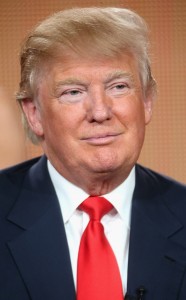
Supporters of U.S. presidential candidate Donald Trump are more likely to describe African Americans as “criminal,” “unintelligent,” “lazy” and “violent” than voters who backed some Republican rivals in the primaries or who support Democratic contender Hillary Clinton, according to a Reuters/Ipsos opinion poll.
Ahead of the Nov. 8 election to replace Barack Obama, the first black U.S. president, the poll also showed significant numbers of Americans in both the Republican and Democratic parties view blacks more negatively than whites, harbor anxiety about living in diverse neighborhoods and are concerned that affirmative action policies discriminate against whites.
Republicans in the survey expressed these concerns to a greater degree than Democrats, with Trump supporters presenting the most critical views of blacks.
The poll, conducted between March and June, interviewed 16,000 Americans and included 21 questions on attitudes about race. It sought responses from voters who support Trump, the presumptive Republican nominee, Clinton, the presumptive Democratic nominee, and her rival U.S. Senator Bernie Sanders. It also surveyed supporters of U.S. Senator Ted Cruz and Ohio Governor John Kasich, the last two Republican candidates to drop out of the race.
“Mr. Trump is an egalitarian who believes in supporting and protecting all people equally,” said Stephen Miller, Trump’s senior policy adviser, when asked about the poll. “This is a stark contrast to Hillary Clinton, whose policies have been a disaster for African-American and Hispanic citizens.”
A spokesman for Hillary Clinton declined to comment on the poll.
(Graphic on racial attitudes of presidential candidates’ supporters tmsnrt.rs/294chjP)
CHARACTER TRAITS
Nearly half of Trump’s supporters described African Americans as more “violent” than whites. The same proportion described African Americans as more “criminal” than whites, while 40 percent described them as more “lazy” than whites.
In smaller, but still significant, numbers, Clinton backers also viewed blacks more critically than whites with regard to certain personality traits. Nearly one-third of Clinton supporters described blacks as more “violent” and “criminal” than whites, and one-quarter described them as more “lazy” than whites.
Clinton is relying heavily on black voters to help her win the White House, and her victory over Sanders in the early state nominating contests was due in part to her overwhelming lead among African Americans.
When asked about where they wanted to live, 36 percent of Trump supporters said, “I prefer to live in a community with people who come from diverse cultures,” compared with 46 percent of Cruz supporters, 55 percent of Kasich supporters and 70 percent of Clinton supporters.
Trump’s supporters were more likely to be critical of affirmative action policies that favor minorities in school admissions or in hiring.
Some 31 percent of Trump supporters said they “strongly agree” that “social policies, such as affirmative action, discriminate unfairly against white people,” compared with 21 percent of Cruz supporters, 17 percent of Kasich supporters and 16 percent of Clinton supporters.
To be sure, not all Trump supporters expressed negative attitudes about blacks. No more than 50 percent of his supporters rated blacks negatively, relative to whites, on any of the six character traits in the poll.
Yet when their answers to the poll questions were compared with responses from supporters of other candidates, Trump supporters were always more critical of blacks on personality traits, analysis of the results showed.
The trend was consistent in the data, even when the results were filtered to include only white respondents to remove any impact that a different racial mix between Clinton and Trump supporters might play in the poll.
The Trump supporters’ views on affirmative action and neighborhood diversity do not necessarily reflect racial bias alone, said Michael Traugott, a polling expert and professor emeritus at the University of Michigan, who is not publicly supporting either Trump or Clinton. Rather, the results could also suggest anxieties about economic insecurity and social standing.
Trump, whose supporters are mostly white, has promised to return manufacturing jobs to the United States, crack down on illegal immigration and pull out of global trade deals that he says have hurt American workers.
“The support for Trump is indicative of the support for the type of policies he is advocating,” said Lawrence Brown, a professor at Morgan State University in Baltimore who writes about racism and has supported Sanders.
Obama said in May that U.S. race relations have improved over the last three decades but that significant work still needs to be done.
The issue of race has assumed great political prominence over the past two years, amid countrywide protests over police treatment of African Americans, economic disparity between blacks and whites, and court challenges to affirmative action and voting rights.
TRUMP FANS VS. CLINTON SUPPORTERS
The Reuters/Ipsos poll asked people to grade whites and blacks on a series of personal traits. The results were then analyzed to compare how each respondent rated whites with how they rated blacks.
In nearly every case, Trump supporters were more likely to rate whites higher than blacks when their responses were compared with responses from Clinton supporters.
For example, 32 percent of Trump supporters placed whites closer to the top level of “intelligence” than they did blacks, compared with 22 percent of Clinton supporters who did the same.
About 40 percent of Trump supporters placed whites higher on the “hardworking” scale than blacks, while 25 percent of Clinton supporters did the same. And 44 percent of Trump supporters placed whites as more “well mannered” than blacks, compared with 30 percent of Clinton supporters.
The online poll, which surveyed people over the age of 18 across the United States, was conducted during two periods in the 2016 election cycle.
The first ran three weeks in March and April, while Cruz and Kasich were still competing with Trump for the Republican nomination. The second polling period covered nearly four weeks in May and June, after Kasich and Cruz had dropped out.
END


Be the first to comment